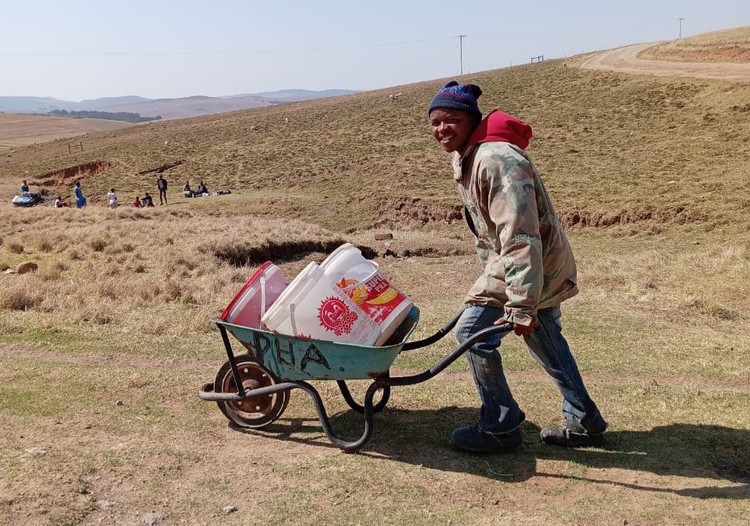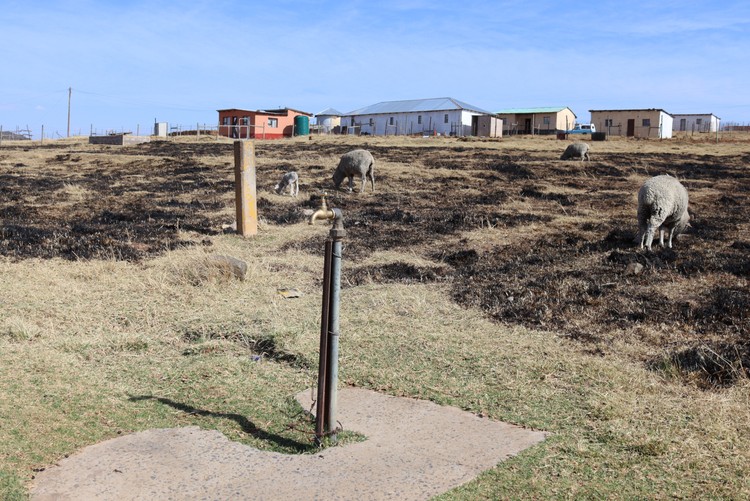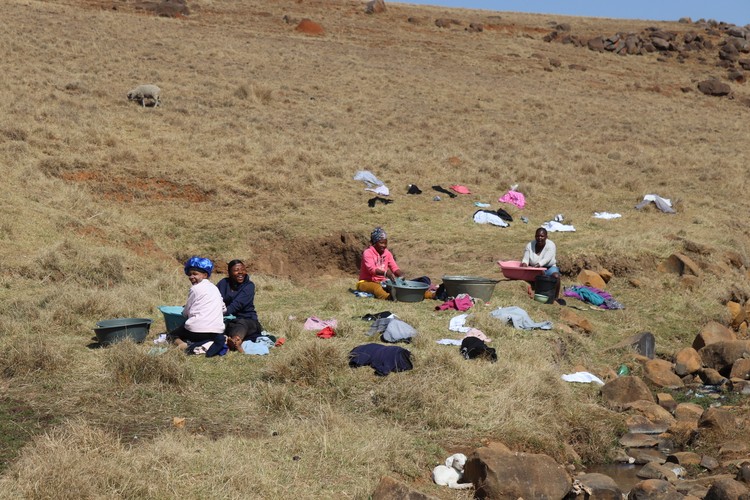Pensioners have to pay people to fetch drinking water from streams
Taps in this municipality have been dry for years
A young man who identified himself only as Mandira, said he walks 2km from the nearest stream, pushing three 20-litre buckets of water. Photos: Nombulelo Damba-Hendrik.
- Despite being less than 5km from a major dam, villagers near Cofimvaba in the Eastern Cape have no water in their taps.
- As a result, hundreds of households have to get their water from streams which are also used by livestock.
- Pensioners who cannot cart large buckets of water, have to use their state grant to pay younger people to fetch water for them.
Villagers in the Cofimvaba area in the Eastern Cape are having to get their drinking water from streams, as most homes have not had municipal water in their taps for five years.
This is despite these villages being within five kilometres of the Tsojana Dam and water treatment works.
As a result of the lack of piped water, elderly people who are not physically able to haul buckets of water, are having to spend a significant percentage of their state pension grant to pay young people to fetch water.
GroundUp visited four of about ten villages in Intiska Yethu ward 16 which borders the Tsojana Dam. In Kuwohlo village, people were washing their clothes in streams, while others upstream were fetching water for drinking and cooking from the same streams.
View Larger Map (This is the area discussed in this article)
These same streams are used by livestock, and are polluted by litter, such as discarded nappies.
GroundUp met pensioner Nowethu Siwendu while she was carrying a five-litre bucket of water from her neighbour’s house. As the stream is 2km from her house, Siwendu asked her neighbour for a bucket of water so she can make tea and take her medication, as she had run out of water.
While she is able to occasionally ask her neighbour for small amounts of water, she has to pay boys in the village to fetch enough for household use.
“For a 20-litre bucket they charge R10, sometimes R20,” Siwendu explain. She said she spends about R300 a month paying people to fetch water for her. This is more than 10% of her R2,180 per month older persons grant, which is her sole source of income.
She said she was waiting for the boys she had hired to come back from the streams, but they were late because it was month-end and a lot of people were ordering buckets of water from them.
In the meantime, her neighbour had helped her out. “She has a water tank but I always try not to bother her because I know water is very expensive. To fill the tank she spent more than R1,000,” said Siwendu.
She said she didn’t know why there was no water in the taps.
Residents in villages in the Cofimvaba area say there has been no water in their taps for about five years.
In neighbouring Madlaleni village, people gather water from the same stream as the residents of Kuwohlo village use. Nosamkelo Msizana from Madlaleni said taps in the village had been dry “for years”. She said she could not remember when last there was piped water.
“The sad part is that there are old people who aren’t able to come fetch water here, they rely on people that they hire,” said Msizana.
But she said the young people who carted water were not careful about where they got it. “Those hired people fetch water in any of the streams. If they find animals they don’t wait for the water to clear, because they are chasing targets. Remember some have to walk 3km carrying two or three 20-litre buckets. Now imagine a person in chronic treatment drinking medication with this dirty water and the sad part is our municipality is dragging their feet in fixing this water issue.”
She said some people had water tanks, and would pay R1,600 for a private water truck to deliver 5,000 litres, but it was not known where they sourced the water.
Pensioner Madlamini Gijana said she pays people to fetch water for her, but when she can, she goes to the stream with her grandchildren and carries a 20-litre bucket on her head, while her grandchildren, the eldest of which is seven, carry five-litres each.
Gijana, who looks after three grandchildren and her son, who is sick, said she puts aside R250 a month from her older person’s grant for water. She said her grandchildren do receive grants, which she collects as their mothers were away looking for work in Cape Town.
Community leader Nande Mathanzima said the lack of water provision also affected schools and clinics.
“When we complain we keep on hearing a lot of excuses like broken pipes, stolen pumps, or illegal connections. It is never clear,” said Mathanzima.
She said water outages started about 2007 and got worse over time.
“Then it was an on-and-off thing. Sometimes we would get water for months, then go for another month (without water), until the taps went dry.”
She said in previous years a water truck would deliver water to those who had funerals, but that had stopped.
Chris Hani District Municipality spokesperson Bulelwa Ganyaza said the villages in this area faced challenges with inadequate water supply due to illegal connections.
These illegal connections, “effected directly from the main line”, prevented water supply from reaching the reservoirs and reaching the rest of the community.
She said the villages in this part of the Intsika Yethu Local Municipality were supposed to be supplied primarily by the Tsojana Water Treatment Works, as well as three boreholes, one of which had been vandalised.
She said Phase one of connecting the Wohlo area to the Tsojana line was a medium-to-long-term solution, and was underway.
Last week a contractor was appointed to refurbish the Tsojana Water Treatment Works to improve water supply to 64 villages.
Women have to wash their clothes in the stream as there is no water in the village taps.
Support independent journalism
Donate using Payfast

Don't miss out on the latest news
We respect your privacy, and promise we won't spam you.
Next: Government stepped in at eleventh hour to save basketball tournament
Previous: Cars destroyed by fire in Free State government pound
© 2024 GroundUp. This article is licensed under a Creative Commons Attribution-NoDerivatives 4.0 International License.
You may republish this article, so long as you credit the authors and GroundUp, and do not change the text. Please include a link back to the original article.
We put an invisible pixel in the article so that we can count traffic to republishers. All analytics tools are solely on our servers. We do not give our logs to any third party. Logs are deleted after two weeks. We do not use any IP address identifying information except to count regional traffic. We are solely interested in counting hits, not tracking users. If you republish, please do not delete the invisible pixel.



